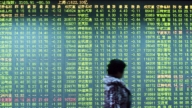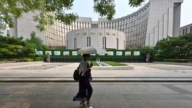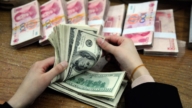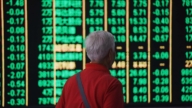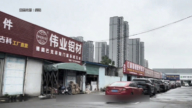【新唐人2013年10月05日訊】隨著「亞太自由貿易區」和「歐美自由貿易區」的推動,中國將完全被屏蔽在國際貿易區之外。為此習李當局急忙推出上海自由貿易實驗區,以應對國際遊戲規則這種顛覆性的變化。不過,儘管上海自貿區已經開業,外界並不看好,因為已經出爐的措施沒有新意,而操作細節又遲遲不出,外界比喻上海自貿區是「潮溼了的爆竹」——難響。
英國媒體的報導寫道,上海自由貿易試驗區成立前後的幾天,諸多跡象令人感到這像一枚「潮溼的爆竹」。文章說,最明顯的例子是,外界寄予相當期望的利率自由化和人民幣自由兌換,實際上,傳遞了明確的反向信息,當局承諾將製訂各式各樣的新規則、定額和行政管控措施,體現了官員們對「熱錢」經由自貿區離境的高度擔憂。
香港媒體認為自貿區「雷聲大,雨點小」,自貿區的「負面清單」與今年3月由國家發改委和商務部公布的《外商投資產業指導目錄》相比較,幾乎沒有差別。
上海自貿區正式成立後的第二天就公布了一份包括近200項內容,涉及18個行業的外資投資限制清單,要求外資投資比例不能超過51%。美國《華爾街日報》表示,這份「負面清單」可能令該試驗區對全球企業的吸引力大打折扣。
中國金融智庫研究員鞏勝利:「它還有一些法律,甚麼《銀行法》、《電信法》都規定了,比如《銀行法》規定外資比例不能超25%,像這樣的電信金融產業人家不能投資,全世界的的法治國家沒有這樣的先例,所以這個上海自由貿易區能走到甚麼程度,還是個未知數,那不走也麻煩,走也麻煩,這就是中國經濟的兩難。」
中國金融智庫研究員鞏勝利受命參加過上海自貿區調研,他認為,自貿區在法律和體制方面的阻力非常大。
鞏勝利:「稅率不解決可能是上海自由貿易區的最大的關鍵點,全國的實行的稅率大概是25%,調研的時候說是把這個稅率降到15%,昨天,中國(共)國家財政部發文說,貿易區的稅率暫不做調整,稅率如果不調整,吸引外資可能就存在一些問題。」
對遲遲不出臺的自貿區具體運作、開放程度等細節,香港媒體分析指出,關鍵在於中央或各部門對其發展內容存在極大分歧,相信短期內也不會有結果。
北京天則經濟研究所副所長馮興元:「所有不符合的自由貿易區的規定,都要在自由貿易區內失效,然後建立新的規則,是這樣倒著推的,那個對各個部門,既得利益者衝擊巨大。」
鞏勝利還透露,因為人民幣和所有的國際貨幣都不兼容,李克強試圖在上海自由貿易試驗區,摸索出一條人民幣自由兌換或者兼容的路子來。不過,鞏勝利指出,目前中國經濟還是靠投資來拉動。
到今年6月底,中國貨幣的發放量已經超過106萬億,而一些壟斷的產業對內對外都不開放。鞏勝利表示,如果上海自貿區失敗,10月底,佔全球經濟80%的「亞太自由貿易區(TPP)」,和「歐美自由貿易區(TTIP)」上路後,中國經濟將逐漸走向崩潰。
鞏勝利:「有一個看點很值得關注,它是不是按照市場經濟地位的方式來運行,還有共產黨要不要在試驗區設立管制機構,比如設個中國上海自由貿易試驗區黨委,可能要等到十三屆三中全會,可能要給個定義。」
美國南卡羅萊納大學艾肯商學院教授謝田,在接受《新唐人》採訪時曾經指出,人民幣在上海自貿區自由兌換,要提防中共官員及利益集團利用來合理洗錢。一旦資本大規模流出,必然帶來人民幣資產價格下跌,中國股市、債市、和房市都會因此而崩盤。
採訪編輯/劉惠 後製/李智遠
Shanghai Free Trade Zone: A Damp Squib
Following the Asia-Pacific Free Trade Zone and EU-US Free
Trade Zone’s carrying forward, China had been marginalized.
In response, Xi Jinping launched a pilot free trading
zone in Shanghai.
Although the Shanghai Free Trade Zone (FTZ)
has officially opened, outsiders are not optimistic.
The regulations are not new,
And details of operation have been delayed.
It was said that the Shanghai FTZ was like
a damp squib – it cannot fire-up.
UK’s BBC Chinese version website said that on the
evidence presented so far, the Shanghai FTZ is a damp squib.
The article states that the most obvious example is the
free exchanging of yuan and liberalizing interest rates
are unlikely to happen.
All manner of the new regulations, quotas and
bureaucratic controls that the regime promised
reflect that officials fear that the “hot money” will leave
China through the new zone.
Hong Kong’s media believe that the new zone is like
loud thunder with very little rain.
Comparing the “negative list” of the Shanghai FTZ with the
“Catalogue for the Guidance of Industries for
Foreign Investment” published in March show very little change.
A day after the Shanghai FTZ officially opened, the regime
announced nearly 200 restrictions on foreign investment.
Among them, 18 industries restrict on foreign investment,
requiring that the proportion of foreign investment
cannot exceed 51%.
Wall Street Journal states that the list could make the
venture far less attractive to global companies.
Gong Shengli, a researcher at the China Financial Intelligence
Unit: It also launched some laws,
Banking Law and a Telecommunications Act.
The Banking Law states foreign investment cannot exceed 25%.
Thus investors will not invest in
the telecommunication industry.
There is no such example in the entire world.
How far the Shanghai FTZ can go is unknown.
To carry on, the Shanghai FTZ, will have trouble,
without carrying on it will also bring trouble.
This is the difficult situation in China’s economy.
Gong Shengli had attended the Shanghai FTZ research, he said
that the new zone had faced great difficulty in legal areas
and the regime’s system.
Gong Shengli: The tax rate issue will be the biggest problem
if it cannot be resolved.
The standard tax rate is 25%, during the research,
they said it will reduce to 10% for the Shanghai FTZ.
Yesterday, the Ministry of Finance said that the Shanghai FTZ
tax rate will remain temporarily unchanged.
However, if this is so, it will be a problem
in attracting foreign investment.
The details of operation are delayed, Hong Kong’s media
analyzed that the central regime had a big disagreement
over the Shanghai FTZs development content.
They said it unlikely to be resolved
in a short period of time.
Feng Xingyuan, deputy director, Unirule Institute of
Economics, Beijing: Any regulation not suited for the
free trade zone, will fail in the new zone.
Then they set up new regulations, that
has brought a huge impact to interest groups.
Gong Shengli revealed that the RMB is not convertible,
Li Keqiang intended to find a way to make it
convertible in the Shanghai FTZ.
Gong said, now China’s current economic situation
relies on investment.
In June, China’s money supply exceeded
106 trillion yuan ($17.3 trillion),
Some monopoly industries are open
neither externally nor internally.
Gong Shengli said that if the Shanghia FTZ fails,
by the end of October, the Asia-Pacific Free Trade Zone and
the EU-US Free Trade Zone, which will make up 80% of the
global economy, China’s economy will gradually collapse.
Gong shengli: One point is worthy of attention,
whether the new zone will operate in accordance with
market economic status?
Whether the CCP will set up a monitoring system
in the new zone?
For example, to establish a free trade zone committee,
it will be decided in 3rd Plenary Session.
Xie Tian, Professor at the Aiken Business School,
University of South Carolina told NTD that allowing the free
exchanging of yuan in the Shanghai FTZ, need to be cautious of
CCP officials using it to legally launder money.
If funds outflow on a large-scale, it will inevitably bring
the yuan related assets price down.
China’s stock market, bond market, and the housing market
will therefore collapse.



